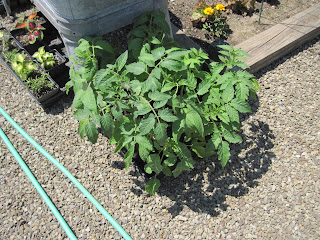The vegetable garden is in. Perennials have been added or replaced. The landscaping has been edged and mulched and the annuals inserted where needed. Because we mulch so heavily each year, I usually plant my annuals in 6 inch peat pots before placing in the landscaping. Many of them will just be nestled into the deep mulch. Sometimes a small amount of soil will have to be dug out to level the pot. On occasion, depending on the location and the annual I will plant directly into the soil. This does not seem to inhibit the plant's growth. I have a parsley plant in a peat pot who is on it's third year and thriving. Having the rim of the peat pot also helps when I water because if the plant is on a slope in mulch, most of the water will run right off. The pot helps catch the water.
 |
| I always buy a spare six pack of marigolds Leftover Sunpatiens and begonias also get potted up. |
When I'm all done with planting annuals, I pot up the leftovers in gallon pots. Sometimes I have intermediate annuals hanging around in 4 inch pots. It's nearly impossible to keep a 6 pack of root bound annuals watered, so if I have leftovers, or a few sub-standard plants, instead of throwing them out I put them in 4 inch pots to grow for a couple of weeks until I find a spot for them.
 |
| What were once scraggly coleus and portulaca plants shelter in the partial shade of the wash basin beside the spare tomato plants. |
Despite the fact that Marigolds are pretty hardy and almost fool proof to grow, they do take a beating from slugs, especially in certain areas of our landscaping. Whenever one gets devoured, I have pinpointed a slug population which can be killed, and then the marigold replaced with a spare. So I buy an extra 6 pack, pot it in gallon pots right away, and then if nothing needs replacing by July, I have nice large plants ready to add to any spot which might needs some color.
I always plant twice as many tomato plants than I need. The first planting went in last week. Three of the spares caught up well enough that I will also plant them, especially since they are odd varieties: Blue Beauty, Lenny and Gracie's Yellow Kentucky Heirloom and Absinthe which is a green tomato. The Lenny and Gracie I tried a couple of years ago and never got a transplant. That was the year I only planted Kentucky Heirlooms. Now I have two healthy, stocky plants that I can't choose between.
This year four of my beds are resting with a green manure crop. I chose buckwheat because it has a white flower which should bring in a lot of honey bees and other pollinators. The seeds had been in the ground a few days when we got a nice warm rain and the next morning I had a whole crop of buckwheat!
Another of my beds is devoted to cutting flowers. This photo is from last weekend too. Down the center are dinnerplate dahlias which are about 6 inches high now. They are supposed to grow to 44"+ so I constructed very stable supports from tomato ladders and bean poles held together with cable ties. Down the sides are snapdragons and zinnias. Besides the nursery transplants I seeded two varieties of zinnias and calendula. Zinnias are another vigorous seed where you plant them one day and after the first rainfall everything pops up. Just like that. The past week has been great growing conditions. I have plants popping up everywhere. Instant gratification. The darn peas take three weeks in the spring. Not three days!
Whats in the ground:
Tomatoes (4 varieties)
Cucumbers (both slicing and pickling)
Peas (3 varieties)
Lettuce and Radicchio
Celery
Bush Beans
Cantalopes
Potatoes (Red and Russet)
Various Herbs
Everything is small but green. Now its just a matter of watering and waiting.
 |
| When your whiskey barrel falls apart and leaves behind its rings, make a garden sphere for free! |






















